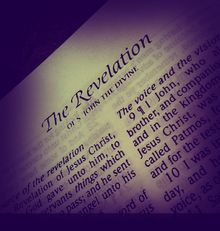Apocalypse: Difference between revisions
Jump to navigation
Jump to search
StephanieJoy (talk | contribs) No edit summary |
StephanieJoy (talk | contribs) mNo edit summary |
||
| Line 1: | Line 1: | ||
[[Image:revelation.jpg|220px|right|thumb|]] | [[Image:revelation.jpg|220px|right|thumb|]] | ||
In many peoples minds the word ''apocalypse'' conjures up images of death and destruction. However, this is not what apocalypse means at all. The English word apocalypse comes from the Greek word ''apokalypsis'', which is given the Strong's number G'''602'''. It is defined as: | |||
<blockquote> | <blockquote> | ||
#laying bare, making naked | #laying bare, making naked | ||
Revision as of 12:35, 23 August 2015

In many peoples minds the word apocalypse conjures up images of death and destruction. However, this is not what apocalypse means at all. The English word apocalypse comes from the Greek word apokalypsis, which is given the Strong's number G602. It is defined as:
- laying bare, making naked
- a disclosure of truth, instruction
- concerning things before unknown
- used of events by which things or states or persons hitherto withdrawn from view are made visible to all
- manifestation, appearance
In the New Testament apokalypsis is usually translated revelation.[1]